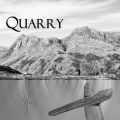Book notes - Cloud Cuckoo Land by Anthony Doerr
Next up... Anthony Doeer's Cloud Cuckoo Land. There's some similarity with David Mitchell's Cloud Atlas, but the latter is (IMHO) a stronger and better constructed book, with all the several storylines making coherent sense (and the ring structure is very cool).
I found Cloud Cuckoo Land a bit patchy - most of the story threads ended up making sense, though the ones set broadly in the now were very broken up at first, and only really took off in the second half of the book when longer narrative passages were given to it. Those two story arcs (Seymour and Xeno) were probably the most compelling.
The two story arcs set around the fall of Constantinople worked well most of the time (and were my favourites for the first half of the book) but became strangely rushed towards the end, and kind of lost the richness of texture that they had started with (and ended up as a fairly contrived way to get the manuscript across to Italy).
The future-based one (Konstance) was to my mind the least convincing, with huge and seemingly unrecognised problems and a weak premise. I kept wondering if whoever did Anthony Doerr's editior noticed these problems and skipped over them without flagging them up, or just didn't see them. Parts of this thread also seemed very derivative (eg of Hal in 2001). I saw one reviewer saying something like that the book is a classic example of a literary fiction author who imagines that to write SF all they have to do is toss in some technobabble and wave their arms a bit! Basically, Doerr should probably stick to historical or contemporary stuff where he is much stronger. According to Wiki, "[Doerr] noted that those sections are "not quite science fiction", but added that they were the result of extensive research into what life could be like then" - well, I agree with his first statement but calling it "extensive research" is a very long stretch!
The other thing we both felt was that we couldn't really see how the main divisions in the text, signalled by divisions in the (fictional) Diogenes tale, had been worked out. The various portions of the several stories didn't seem to have much to do with the provided fragments of Diogenes, and were uneven in timespan and content. So the overall structure of the book didn't seem to contribute to the whole (again contrast Cloud Atlas where the structure is tightly bound into the stories).
Where Doerr does undoubtedly shine is in his prose style, which is delightful to read even in the parts which are dubious on other grounds! I've just been listening to some Arthur C Clarke (Rendezvous with Rama) where the science is almost infinitely better, and the sequence of events makes good sense, but whose prose style is exceptionally ordinary. Quite a contrast. I'd be happy to read more of Doerr for that reason alone, and All the Light we Cannot See seems to be his most highly recommended book.

 Help offset server costs by donating. This is totally optional. Any overages will go to library fines or new books.
Help offset server costs by donating. This is totally optional. Any overages will go to library fines or new books.
